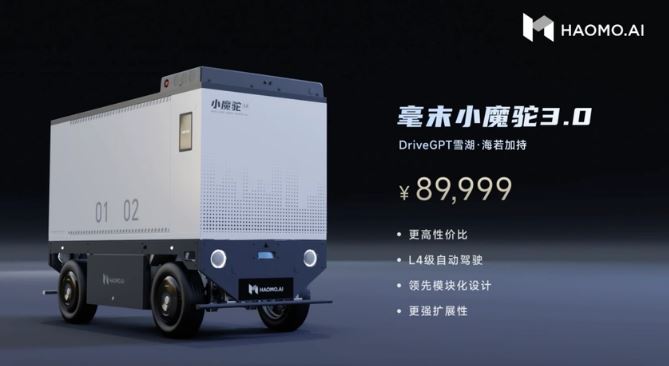Haomo.ai, a Beijing-based tech firm supported by Great Wall Motor, has introduced its latest generation of the Little Magic Camel, an autonomous delivery vehicle that it claims is the world’s most affordable. With Level 4 capability, the modular logistics solution is expected to capitalize on the growing demand for automated deliveries. Haomo plans to sell the vehicle in China for approximately $12,750, aiming to benefit from the projected boom in the global automated delivery market, which could reach $424.3 billion by 2030.
While facing setbacks in other regions, Haomo remains confident in the potential for “large scale” deployment of autonomous vehicles in China by 2025. The company’s ability to offer the vehicle at such a competitive price is attributed to the utilization of technology developed for autonomous passenger cars and leveraging the existing supply chain.
The Little Magic Camel 3.0 features a sensor suite comprising three solid-state lidars and seven high-definition cameras. It is powered by a 360 Tera Operations Per Second (TOPS) domain controller, supported by Qualcomm Snapdragon Ride dual chips. Additionally, Haomo’s DriveGPT Xuehu Hairuo, an AI model for self-driving trained on over 30.4 million miles of driving data, enhances the vehicle’s autonomous capabilities.
With an expected range of 87 miles and the ability to operate at low speeds on urban roads in most Chinese cities, the Little Magic Camel 3.0 offers practicality at an affordable price point. Despite its compact dimensions (3.6 feet wide and 7.8 feet long), the vehicle provides a load volume of 70.6 cubic feet, expandable to 105.9 cubic feet if necessary.
The previous versions of the Little Magic Camel have already gained significant traction in the market, with over 170,000 orders placed across China. These vehicles are being utilized in various scenarios, including supermarket deliveries, airport patrols, and on university campuses.
Zhang Kai, Chairman of Haomo, recognizes the vast potential of automated delivery, emphasizing the need for collaboration with industry partners to build a diverse and robust ecosystem to meet the complex and varied demands of the market.

